Picture: At Schloss Johannisberg in the Rheingau at "Spätlese Reiter" (Later Harvest Rider) Monument, with Christian Wiite, General Manager of Weingut Schloss Johannisberg
The Germany-North Tour by ombiasy WineTours (September 6 – September 12, 2015) was the third of three wine tours in Germany in 2015, organized by Annette Schiller. The group was small - there were 7 of us, including Annette and Christian Schiller. This posting provides an overview. More specific postings focusing on individual events will follow (see list below).
On the Germany-North Tour by ombiasy WineTours in 2015, we visited a total of 14 wineries in 5 different wine regions: Rheingau, the jewel in the crown, with its perfect, fuller bodied, racy Rieslings; Mittelrhein where the Rieslings grow on the steep slopes of the fortress- and castle-ribboned banks of the Rhine river; Ahr with its sun collecting canyons perfect for the finicky Pinot Noir grape; Mosel with its dizzying steep vineyards and famous elegant Rieslings; Nahe and its serene, peaceful valley where perfect harmonious wines reflect their roots.
Annette Schiller: Our way of traveling allows wine lovers to fully experience authentic Germany. Drawing on our love and deep knowledge of Germany and close personal ties to many personalities in the wine scene, our small group visits many of the hidden gems that other tours pass by, but which are essential to comprehend what German wine is all about.
DAY 1: Sunday, September 06
09:30 am Departure in Frankfurt.
10:30 am Tour and tasting at winery Baron Knyphausen (VDP) in Erbach, Rheingau.
The winery Baron Knyphausen goes back to one of the oldest viticultural enterprises. The Draiser Hof -home of the winery- was built in 1141 by the Cistercian monks of the Eberbach Abbey to cultivate the monastery’s vineyards and fields in Erbach and Eltville.
In 1818 the Baron zu Knyphausen family purchased the estate and the vineyards. The holdings include the famous Erbacher Marcobrunn, one of the top terroirs in the Rheingau. Almost 60 acres are under vines and planted mostly with Riesling (85%), and with 10% of Pinot Noir and 5% with indigenous grapes such as red Riesling.
Gerko Freiherr zu Knyphausen was our host.
12:45 pm Lunch at Restaurant & Gutsausschank Baiken in the vineyards above the town of Eltville.
This wine tavern sits right in the middle of the vineyards on the hill overlooking the town of Eltville. Indulge in the unrivaled view on the vineyards around you and the Rhine river below. Enjoy the food carefully selected and sourced from local farms and the excellent selection of wines from the Rheingau region.
03:00 pm At Weinhotel Koegler in Eltville - a small, upscale boutique hotel located within the historic walls of the Koegler winery in the center of Eltville with a wonderful combination of medieval stone walls and ultra modern décor. We spend the night in a house that made world history: In 1467 it was here that Johannes Gutenberg created the most important early prints of the oldest dictionary world-wide.
In the afternoon we explored the beautiful upmarket, historic town of Eltville situated right on the banks of the Rhine River. Annette and I took a break at the wine tasting booth at the river front and enjoyed watching the cargo boats that travel the river up- and downstream.
06:00 pm At Eberbach Abbey, where we attend a concert as part of the Rheingauer Music Festival.
Eberbach Abbey is a former Cistercian monastery, founded in 1136 by Bernard of Clairvaux as the first Cistercian monastery on the eastern bank of the Rhine river. Today Eberbach Abbey is one of the five State-owned wineries (the State of Hesse is its proprietor) and with 500 acres the largest winery in Germany. Its Romanesque and Gothic buildings are impressive. The vineyards of Eberbach Abbey were, at 750 acres, the largest in medieval Europe. We had the opportunity to tour the Abbey, including the old monk’s dormitory where every year the famous auction of premium German wines takes place. A very special treat was a peek into the treasure chamber, where century old wine bottles are still stored and where the movie “The Name of the Rose” with Sean Connery was filmed in 1986.
06:00 pm Multiple concerts (Lieder, Baroque Music, Guitar Music) in the different halls of the Eberbach Abbey, performed by members of the Frankfurt School of Music and Performing Arts.
08:00 pm Concert in the Basilika of Eberbach Abbey: “L’isola disabitata” by Joseph Haydn, performed by the ensemble of the Frankfurt School of Music and Performing Arts.
DAY 2: Monday, September 07
11:45 am Tour and Lunch with wine pairing at Wein- und Sektgut Barth in Hattenheim.
The Wine and Sekt Estate Barth was founded in 1948 by the father of Norbert Barth, the current owner. Besides excellent wines, from early on Barth produced sparkling wines – Sekt – and in 1992 a Sekt manufactury was completed to be able to produce the Sekts entirely at the premises. All Sekts are bottle fermented in the méthod traditionelle starting with base wine production, subsequent bottling, bottle fermentation, hand-riddling, and disgorging. All Sekts remain on the lease between 24 and 36 months. In 2010 Barth released the first ever German sparkler made from a Premier Cru base wine. The novelty was named Barth Primus, and put Barth on the map for the serious Sekt lover.
Mark P. Barth was our host.
03:00 pm Visit and tasting at winery Josef Spreitzer (VDP) in Oestrich.
The winery Spreitzer is one of the oldest in Oestrich and can look back to a viticulture tradition since 1641. Current owners are the brothers Andreas and Bernd and they share the opinion that wine is both, a philosophy of life and a tremendous joie de vivre. Their 46 acres of vineyards are planted with the Rheingau’s classic varietals, Riesling (97%) and Pinot Noir (3%). Quality is of utmost importance here and the gorgeous vaulted cellar, built in 1743, guarantees perfect conditions for storing and ageing the wines. The results are aromatic Rieslings that regularly are rated among the best of the Rheingau.
Bernd Speitzer was our host.
05:00 pm Departure for Bacherach
On the way we stopped at the Oestricher Kran, a former wine barrel loading crane dating from 1744. This is the only preserved testimonial of an old technique to load and discharge cargo. The Oestricher Kran was in use until 1926.
The short journey to Bacharach involved a ferry ride across the Rhine river. There is no bridge across the Rhine River for some 70 miles between Mainz and Koblenz to not destroy the beauty of the Rhine valley.
06:00 pm At Hotel Altkölnischer Hof in Bacharach, Mittelrhein, a 3 star charming, family run hotel with all modern amenities in the center of the romantic 1000 year old town of Bacharach.
The evening in this more than 1000 year old town with its castles, church spires, medieval city wall, and half-timbered houses on the shore of the Rhine River was fascinating. This was pure “Rheinromantik”.
DAY 3: Tuesday, September 08
09:00 am Visit and tasting at winery Toni Jost (VDP) in Bacharach, Mittelrhein.
For over 180 years, the Jost family has been cultivating vineyards in Bacharach. The family’s focus was always on acquiring vineyards in Bacharach’s top site, the so-called Hahn. Today, five generations later the “Hahn” almost exclusively belongs to the Jost estate. Current owner is Peter Jost together with his daughter Cecilia, who is also the winemaker. The 37 acres of vineyard land are planted mostly with Riesling (80%). 15% is planted with Pinot-Noir, and the rest with Pinot-Blanc, and Dunkelfelder (a cross breed between Farbertraube and Blauer Portugieser, however more sophisticated DNA tests show different parents). One third of the vineyards are located in the Rheingau region, in Walluf and Martinsthal. Because of these vineyards in the Rheingau the estate has been a member of the VDP Rheingau since 1989. In 1987 Peter Jost was founding member of the VDP Mittelrhein.
Cecilia Jost was our host.
11:15 am Cruise on the Rhine River from Bacharach to Boppard.
We took a cruise on the Rhine, passing the famous Loreley Rock and the slopes of the Mittelrhein wine region. Time to indulge in the breathtakingly beautiful view of the Rhine River and its banks dotted with castles, fortresses, and ruins dating from the middle ages. The Middle-Rhine valley is listed as a UNESCO World Heritage site.
12:50 pm Lunch at the beautiful Belle Epoque restaurant Le Bristol in the Hotel Bellevue in Boppard right on the Rhine river.
04:30 pm Visit and tasting at winery J.J.Adeneuer in Bad Neuenahr-Ahrweiler, Ahr.
This winery has been in the hands of the same family for 500 years. The brothers Marc and Frank concentrate exclusively on the red Pinot grapes: Pinot Noir (90%) and Pinot Noir Précoce (10%). They explain the reason for their decision: “At the end of the day, Pinot Noir is always good for a surprise and therefore, it requires more attention.” For the Adeneuers, terroir is noy just a trendy word, but rather “the soul of the wines”. They are the sole owners of the spectacular site “Walporzheimer Gärkammer”.
Marc Adeneuer was our host.
06:45 pm At hotel Ännchen in Bad Neuenahr-Ahrweiler, a 3 star family run hotel within the medieval town walls in Ahrweiler on the pedestrian precinct.
We had dinner in the medieval Old Town and tried some more fine Ahr wines.
DAY 4: Wednesday, September 09
09:30 am Vineyard walk and tasting at winery Meyer-Näkel (VDP) in Dernau, Ahr.
This winery has long been recognized as one of the top estates for producing great Pinot-Noirs. The Ahr valley north of the 50 °latitude is unquestionable the northernmost region for producing top Pinot-Noirs. The secret lies in an ideal micro-climate found in the narrow canyons along the river with their very special geological conditions, and south-facing slopes. Wine making along the tiny Ahr river goes back to Roman times. The Meyer-Näkel wine estate as we know it today was established upon the marriage of Paula Meyer and Willibald Näkel, the parents of the current owner. Although Willibald Näkel only cultivated 4.5 acres under vines he was already a pioneer for the then rather unusual dry red wines from the Ahr valley. Today’s winery encompasses 48 acres and is managed by Werner Näkel, his wife Claudia and their daughters Meike and Dőrte.
Dörte Näkel was our host.
12:30 pm Lunch at Historisches Gasthaus Hammesmühle in Mayen.
04:15 pm Tasting at winery Dr. Loosen in Bernkastel-Kues, Mosel.
The Dr.Loosen winery has been in the hands of the Loosen family for over 200 years. Located just outside of Bernkastel, it is one of the larger producers in the Mosel region with 130,000 bottles produced annually. In the US the winery is particularly known for its sweeter style Rieslings of top quality. Ernst Loosen is the current owner and while most often associated with the sweet-style, low alcohol wines very often to be found on the shelves of wine stores in the US, he is producing top dry Rieslings on the Premier and Grand Cru (GG) level, which he recently introduced to the market in the US. He also produces white and red wines in the Pfalz in Germany (J.L.Wolf winery) and in the US in Washington state (Chateau St. Michelle) and in Oregon (J. Christopher wines).
Markus Schulte was our host.
06:45 pm At Märchenhotel in Bernkastel-Kues, a 4 star elegant cultural heritage hotel that opened its door to travelers in 1640. It is owned and managed by the 10th generation of the same family. It is located in the center of the picturesque village of Bernkastel.
We had a lovely evening in this picture-perfect little town, had a glass of Mosel Riesling at the Spitzenhäuschen, and walked along the banks of the Mosel River.
DAY 5: Thursday, September 10
09:30 am Tasting at winery St. Urbans-Hof (VDP) in Leiwen, Mosel.
St. Urbans-Hof is a rather young wine estate by European standards. The winery was established in 1947 by the grandfather of the current owner Nik Weis. Nik’s father, Hermann Weis mastered the art of vine grafting and was well known in Germany and beyond for his skills. He was particularly known for his work with the Riesling grape. In the beginning of the 70s, he pioneered the use of Riesling in Canada, which was then still new to the idea of quality wine making. Hermann Weis planted the first Riesling vines in the Niagara Peninsula. This developed later into the Vineland Estate Winery. At home in Leiwen he expanded the estate considerably and his son Nik now cultivates 79 acres of vines in a broad spectrum of outstanding sites in the Mosel and Saar valleys. In 2010 the Feinschmecker (the most prestigious gourmet and wine magazine in Germany) ranked St. Urbans-Hof among Germany’s 16 five star wine estates. The wines show elegance, lightness and finesse. The majority of the production goes into the export and the St. Urbans-Hof wines are widely available in the US and Canada.
Nik Weis was our host.
01:00 pm Vineyard tour, tasting and wine pairing lunch at winery Van Volxem (VDP) in Wiltingen, Saar valley, Mosel.
The Van Volxem winery is located in the center of the historic town of Wiltingen in the valley of the Saar river, a tributary of the Mosel. The foundation of the estate is a villa from Roman times, still visible today. Some of the estate’s best vineyard sites have already been laid out and cultivated by the Romans in the 3rd century and are among the steepest ever. The Van Volxem wines have a very distinctive purist style.
Roman Niewodniczanski was our host.
06:00 pm At Mercure Hotel in Trier, a modern 4 star hotel near the heart of the city center and just across the street from the Porta Nigra.
06:30 pm Guided sightseeing tour through Trier.
Trier sits on the banks of the Mosel River and is the oldest city in Germany. In Roman times it was the largest city north of the Alps, and the second most important city of the Roman Empire. For some years it even became an imperial city. This 2000 year old city is a treasure trove of Roman and German history, and pagan and Christian culture. There is so much to see in Trier, but the famous landmarks from Roman times are a must: the Porta Nigra, the amphitheatre, and the imperial thermal baths. The most eminent citizen of Trier in modern times was Karl Marx, who was born and raised here.
07:30 pm Dinner at the Weinhaus in Trier.
This wine tavern has an excellent list of top wines from the Mosel, Ruwer, Saar Valleys, and also from other German wine regions, as well as from France, Italy, and Spain.
DAY 6: Friday, September 11
10:30 am Tasting at winery Hexamer, in Monzingen, Nahe.
Weingut Hexamer is a family-owned and run winery in Meddersheim in the Nahe region. The vineyard area totals 23 hectares in Meddersheim, Schlossböckelheim and Sobernheim, with Riesling accounting for 60 percent. The family name, Hexamer, dates back centuries in Germany and has a history of winemaking; however, it was not until the late 1990’s when the Hexamer family began producing commercially, i.e. when Harald Hexamer and his wife Petra took over.
Harald Hexamer is convinced that the key to making top wines is the work in the vineyard. Accordingly, Harald Hexamer’s meticulous work in the vineyard is marked by pruning to control yields (“often six to eight bunches per wine”) and hand-harvesting. The grapes are picked exclusively by hand and fermented very cold (below 12 degrees Celsius) with cooling utilized only when necessary – “but we often pick so late we bring naturally cold fruit — below 10 degrees — back to the winery.” Hexamer handles the wine as little as possible: no dosage is used, inoculations are made only with native yeasts, and all wines are whole-cluster pressed. 95% of all Rieslings at Hexamer are made in stainless steel and racked only once, three to six weeks after fermentation is complete.
Harald and Petra Hexamer were our hosts.
01:00 pm Lunch at Hermannshöhle, Restaurant Weck in Niederhausen.
02:45 pm Tour and tasting at Weingut Gut Hermannsberg (VDP), in Niederhausen, Nahe
This wine estate goes back to the year 1901 when the Prussian government founded the domain on steep, rugged land in the central Nahe valley as a model operation to help revive the wine industry after the phylloxera disaster. Planting vineyards here was an extraordinary effort: rocks had to be blasted and huge masses of earth moved. Until well into the 1980s the domain stayed in public hands. Owner was the State of Rhineland-Palatine, since 1946 the successor of the Prussian State. The estate was privatized in 1998. In 2010 it changed hands again and was renamed Gut Herrmannsberg. The new owners invested heavily and brought the estate back to its glory. The vineyards cover 30 hectares and all of which are located in Grand Cru sites. The legendary Kupfergrube, the monopol site Hermannsberg, and the unique Traiser Bastei number among the best Riesling sites in Germany and of the world.
05:30 pm At NH-Hotel in Bingen, a 4 star very modern hotel beautifully situated at the confluence of the Nahe and Rhine rivers, with stunning views across the Rhine to the vineyards and castles on the Rheingau side.
07:00 pm Dinner with wine pairing and cellar tour at winery and restaurant Kruger-Rumpf (VDP) in Münster-Sarmsheim, Nahe.
“In our family, viniculture has been a tradition since 1708 - a tradition that we have been cultivating in our vineyards as well as in our manor house which was built back in 1830” says Georg Rumpf. Today, the vineyard totals about 50 acres and the annual production is 14,000 cases. Georg Rumpf has taken over the winemaking at Weingut Kruger-Rumpf, while his father Stefan now focuses more on sales, and his mother Cornelia manages the restaurant. The wines, gourmet regional food, the hospitality and warmth of the family, and the ambiance in this lovely estate where modernism is perfectly combined with tradition, are outstanding.
Georg Rumpf was our host.
DAY 7: Saturday, September 12
09:00 am Departure. Again we took the ferry across the Rhine River to continue our journey.
09:30 am Tour and tasting at Sektmanufaktur Bardong in Geisenheim, Rheingau.
With this visit we honored the German’s affinity with the bubbly stuff. Did you know that the Germans are world champions in sparkling wine consumption? And that “Rotkäppchen” in Freyburg, in the Saale-Unstrut region is the world’s second largest sparkling wine producer after Freixenet? And that there are many top rated Sekt producers in Germany?
Our visit took us to one of the small, top notch Sekt (the German word for sparkling wine) producers. Norbert Bardong studied beverage technology at the Geisenheim Oenological University when he fell in love with Champagne and decided to make his own Sekt in the méthode traditionnelle to have a sparkler on par with the quality of the Champagne region. His philosophy: no mass production, top quality, “small but beautiful”, first class base wines, at least 36 months on the lease. We will learn on the ground what it entails to produce a first class Sekt.
Norbert Bardong was our host.
11:45 am Cellar tour, tasting and lunch at Domaine Schloss Johannisberg (VDP) in Geisenheim, Rheingau.
This visit was a fitting finale and a highlight of our tour through the northern German wine regions. It is the world’s oldest Riesling wine estate going back 900 years and it was here that the “Spätlese” was accidently discovered. We will visit the historical casks cellar from 1721 and the former monastery cellar built nine centuries ago. For many centuries the estate was owned by the Prince-Abbot of Fulda, but changed hands several times during the Napoleonic wars and subsequent secularization. In 1816, Austrian Emperor Francis II, gave the estate to his Foreign Minister, Prince von Metternich, as a thank you for his successful negotiations in the reorganization of Europe during the “Congress of Vienna”. The last resident of the Metternich family at Schloss Johannisberg, Tatjana Princess von Metternich was a patron of the arts in the Rheingau and beyond and revived the castle to its former gory after the destructions during World War II. After her death in 2006, the Oetker family (yes, that's the one that produces baking helpers and puddings) bought the estate. Current estate manager is Christian Witte who fabulously manages the domaine and honors the long traditions at Schloss Johannisberg by focusing rigorously on quality. The Johannisberg wines show substance, considerable volume, and a spicy fruitiness paired with pronounced acidity.
Christian Witte was our host.
03:15 pm Arrival at Frankfurt International Airport
Postings on the Germany-South Tour by ombiasy WineTours (2015) (Posted and Forthcoming)
4 Wine Tours by ombiasy coming up in 2015: Germany-East, Germany-South. Germany-Nord and Bordeaux
Fall Tours by ombiasy WineTours 2015 - A Very Special Treat: Experience Harvest Time !
Germany-North Tour by ombiasy WineTours (2015)
Tour and Tasting at Weingut Baron Knyphausen in Erbach, Rheingau
Wine and Music at Eberbach Abbey
Tour and Wine Lunch at Wein- und Sektgut Barth in Hattenheim, Rheingau
Tour and Tasting at Weingut Josef Spreitzer in Oestrich, Rheigau
Wine Tasting at Weingut Toni Jost in Bacharach, Mittelrhein
Cruise on the Rhine River from Bacharach to Boppard, Mittelrhein
Wine Tasting at Weingut J.J.Adeneuer in Bad Neuenahr-Ahrweiler, Ahr
Vineyard Walk and Tasting at Weingut Meyer-Näkel in Dernau, Ahr
Wine Tasting at Weingut Dr. Loosen in Bernkastel-Kues, Mosel
Wine Tasting at Weingut St. Urbans-Hof in Leiwen, Mosel
Vineyard Tour, Tasting and Lunch at Weingut Van Volxem in Wiltingen, Saar, Mosel
Wine Tasting at Weingut Hexamer, in Monzingen, Nahe
Tour and Tasting at Weingut Gut Hermannsberg, in Niederhausen, Nahe
Tour and Wine Dinner at Weingut Kruger-Rumpf in Münster-Sarmsheim, Nahe
Tour and Tasting at Sektmanufaktur Bardong in Geisenheim, Rheingau
Tour, Tasting and Lunch at Domaine Schloss Johannisberg in Geisenheim, Rheingau
Tuesday, October 6, 2015
Germany-North Tour by ombiasy WineTours (2015), Germany
Labels:
2015,
Ahr,
Germany,
Mittelrhein,
Mosel,
Nahe,
Ombiasy Wine Tours,
Rheingau
Subscribe to:
Post Comments (Atom)





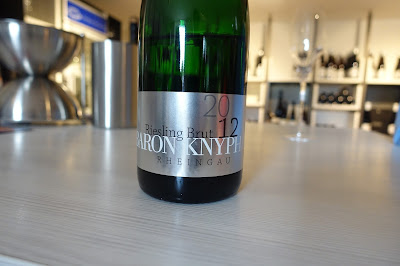










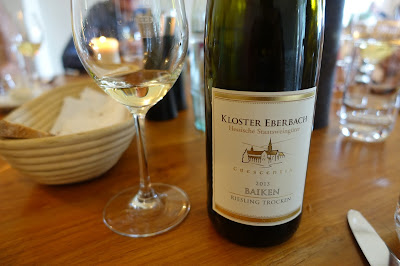
















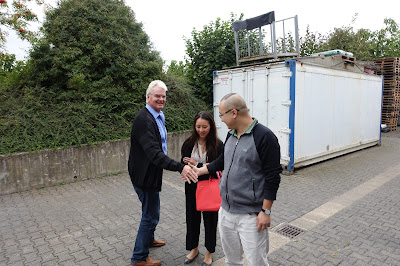










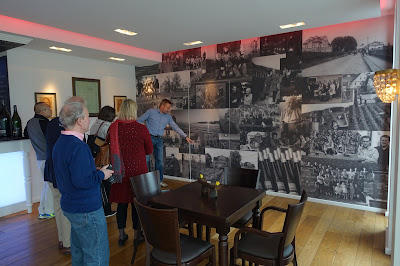









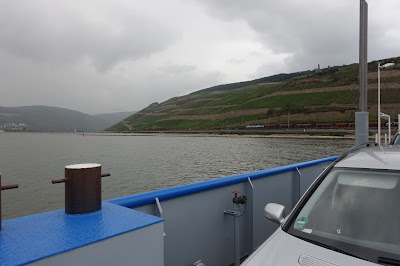





































































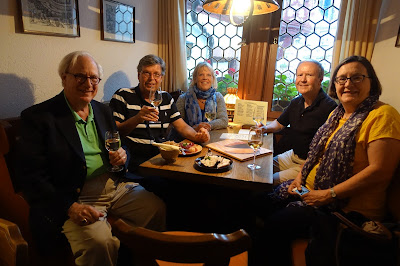








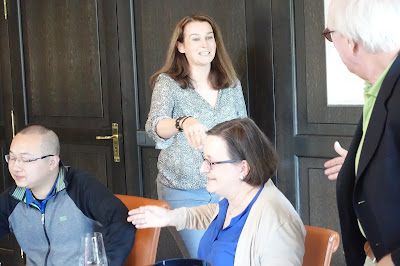




























































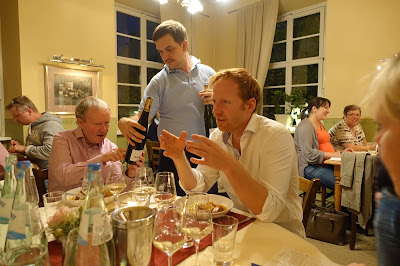











































No comments:
Post a Comment